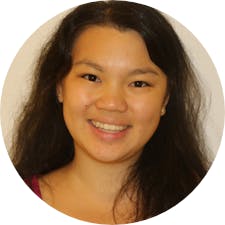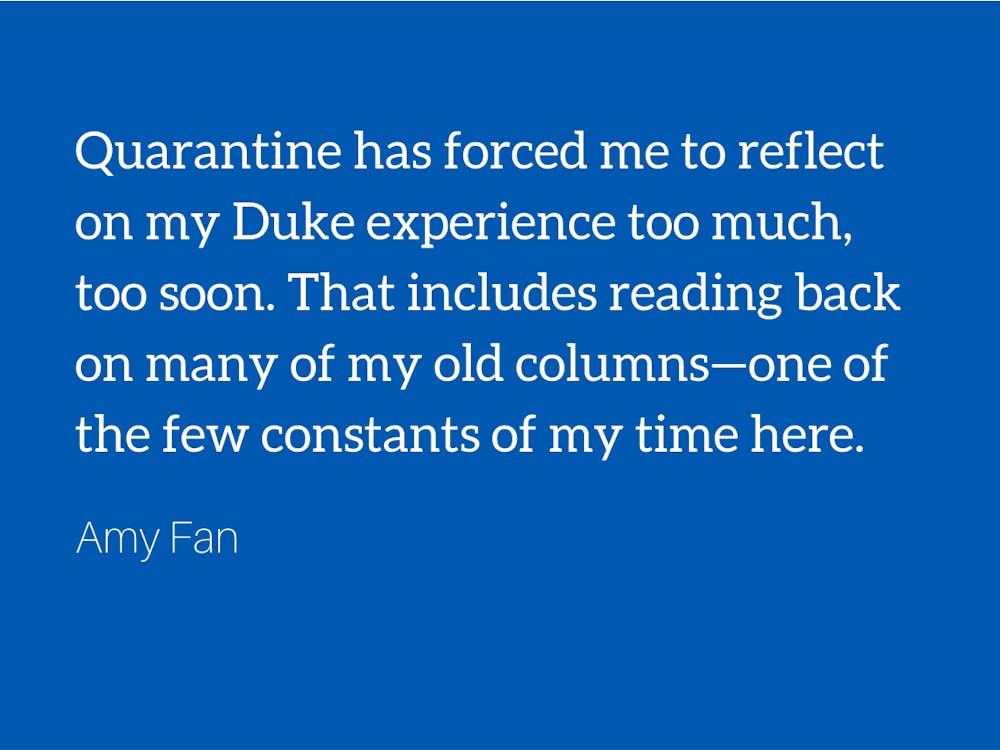I was walking through the Duke Gardens when I learned that classes were moving online, and I remember thinking how ironic it was that campus was going to be at its emptiest right before it was about to be at its most seductive. The tulips had been planted but hadn’t yet bloomed, the koi pond was being cleaned, and no one was going to see that effort. I had visited campus at around the same time as a high school senior and fallen in love.
Quarantine has forced me to reflect on my Duke experience too much, too soon. That includes reading back on many of my old columns—one of the few constants of my time here. And after writing over 30 columns ranging from the purely anecdotal to the purely data-driven, I wonder: why did I do all this public writing? I wasn't doing the noble job of the journalists in 301 Flowers. Wouldn’t all this writing eventually be cringeworthy and irrelevant at best, harmful to a future career at worst?
My first column about a month after arriving at Duke was about how orientation and the first few weeks of college felt awkward. The Chronicle used to have word reacts for pieces, and the top one for that column was..."propaganda.” Later, I wrote about how both formal and informal processes seemed to divide the student body, and about the awkwardness of SLG rush. More than once, I questioned whether I was really making friends and what “community” meant. I thought I had kept most of my insecurities from my first year in my private notebooks, but more than once I recognized them in my columns.
Rereading my first-year columns is tangible (and sometimes cringeworthy) evidence that in so many ways, I'm not 2016-2017 academic year Amy anymore, but also of how much I’ve learned the logic of Duke and its students since then.
O-week was awkward, sure, but rush was more of the same, as was networking. This was just preparation for the real world. Social segregation is real, even institutionalized, but what's so wrong with people wanting to make friends with people like them? People frame narratives to fit the stories they want to tell, but that’s how you get people to pay attention. And later on: preprofessionalism is rampant, but that's just the kind of student who comes to Duke. People can be sexist, racist and selfish, but you gotta deal with it if you want to be successful—life’s not fair.
I still don’t entirely subscribe to these rationalizations, as I worry about how these same issues will seep into our post-Duke lives. I’m already seeing how this pandemic claims to be a great equalizer but still creates disparities between people of, among other things, different races, genders, occupations, and socioeconomic statuses.
But I don’t entirely reject these logics either, and I’m not sure how to feel about that. This pandemic has also revealed how fragile our social constructs can be—how easily the undergraduate community can be dissolved under the right conditions, how so much money can be pumped into the economy with the right explanations, how quickly our circumstances can change with enough political will.
The social divides that I mentioned above across lines of race, gender, occupation, and socioeconomic status were supposed to matter less at Duke. For these four (ish) years, we were all just Duke students, and the school was so carefully (albeit imperfectly) designed so that people with different pasts and different futures could meet each other. Be friends, even. Was it successful? What does success even mean? Those first-year columns don’t offer any answers. I don’t know what will.
I didn’t realize this in Fall 2016, but the Chronicle was the best place for me to explore what still feel like unanswerable questions. A student free press committed to holding institutions accountable combined with the flexibility as a columnist to write about anything with any approach—qualitative, quantitative, or a mix—isn’t something that often exists outside of a college newspaper.
My best answer to the question at the beginning of this column—why do public writing?—used to be practical. Deadlines and a public audience would force me to write regularly and well. But upon re-reading who I used to be, I like to think there’s some personal significance too. My memories of Duke, with time, will gradually become romanticized and filtered until only a highlight reel remains: college was when I had so much time to spend with friends on a gorgeous campus, where the biggest worry in my life at one point was whether my dirty white tent was staying together, where I got the chance to travel abroad and spend my summers in new places, where I was always exposed to new ideas and grew in such crucial ways.
However, even if my recollection of undergrad evolves, these words won’t be changing. I wonder how I’ll look back on them.
Thank you all for reading.
Amy Fan is a graduating Trinity senior. She would like to thank Leah so, so much for being a fantastic editor these past few years; Qiang for responding to that random email from a first-year about writing a column; Jack for singlehandedly being the reason she started writing data-driven pieces; Kat and Jess for faithfully reading and responding to every piece; Cyan and Elise for being her roommates and being there as she fretted over deadlines; Emily, Robbie and Thanh for fangirling over this column before ever befriending her; James and Matthew for four years of talking about columns (also because Matthew asked to be included); all the other friends who entertained her ideas and gave her the love and support she didn’t know was possible; and the broader Duke community for including these columns as part of campus conversation.
Get The Chronicle straight to your inbox
Signup for our weekly newsletter. Cancel at any time.

Amy Fan is a Trinity senior. Her column, "fangirling," runs on alternate Thursdays.

